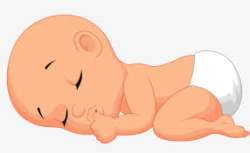Solid foods may help infants sleep longer
Of the 1,303 infants who took part in the study, 94 per cent (1,225), completed the three-year questionnaire -- 608 from the exclusive breastfeeding group and 607 from the early introduction of food group.

Infants introduced to solid foods early may have lesser sleep problems as compared to those who are breastfed, a new study has found. The researchers found that babies introduced to solid foods early slept longer and woke less frequently at night and suffered fewer serious sleep problems than those exclusively breastfed for around the first six months of life.
"While the official guidance is that starting solid foods won't make babies more likely to sleep through the night, this study suggests that this advice needs to be re-examined in light of the evidence we have gathered," said lead author Gideon Lack, professor at the King's College London.
For the study published in the journal JAMA Pediatrics, the researchers involved 1,303 exclusively breastfed three-month-olds who were divided into two groups.
One group followed standard infant feeding advice and was encouraged to exclusively breastfeed for around six months. The second group, while continuing to breastfeed, was asked to introduce solid foods.
Parents completed online questionnaires every month until their baby was 12 months and then every three months up to three years of age.
The questionnaires recorded the frequency of food consumption and included questions about breastfeeding frequency and duration, besides sleep duration.
Of the 1,303 infants who took part in the study, 94 per cent (1,225), completed the three-year questionnaire -- 608 from the exclusive breastfeeding group and 607 from the early introduction of food group.
Differences between the two groups peaked at six months, with the early introduction group sleeping for a quarter of an hour (16.6 minutes) longer per night (almost two hours longer per week). Its night waking frequency decreased from just over twice per night to 1.74.
Feedback on maternal wellbeing showed that sleep problems (as defined by the parents), which were significantly associated with maternal quality of life, were reported less frequently in the group introducing solids before six months.